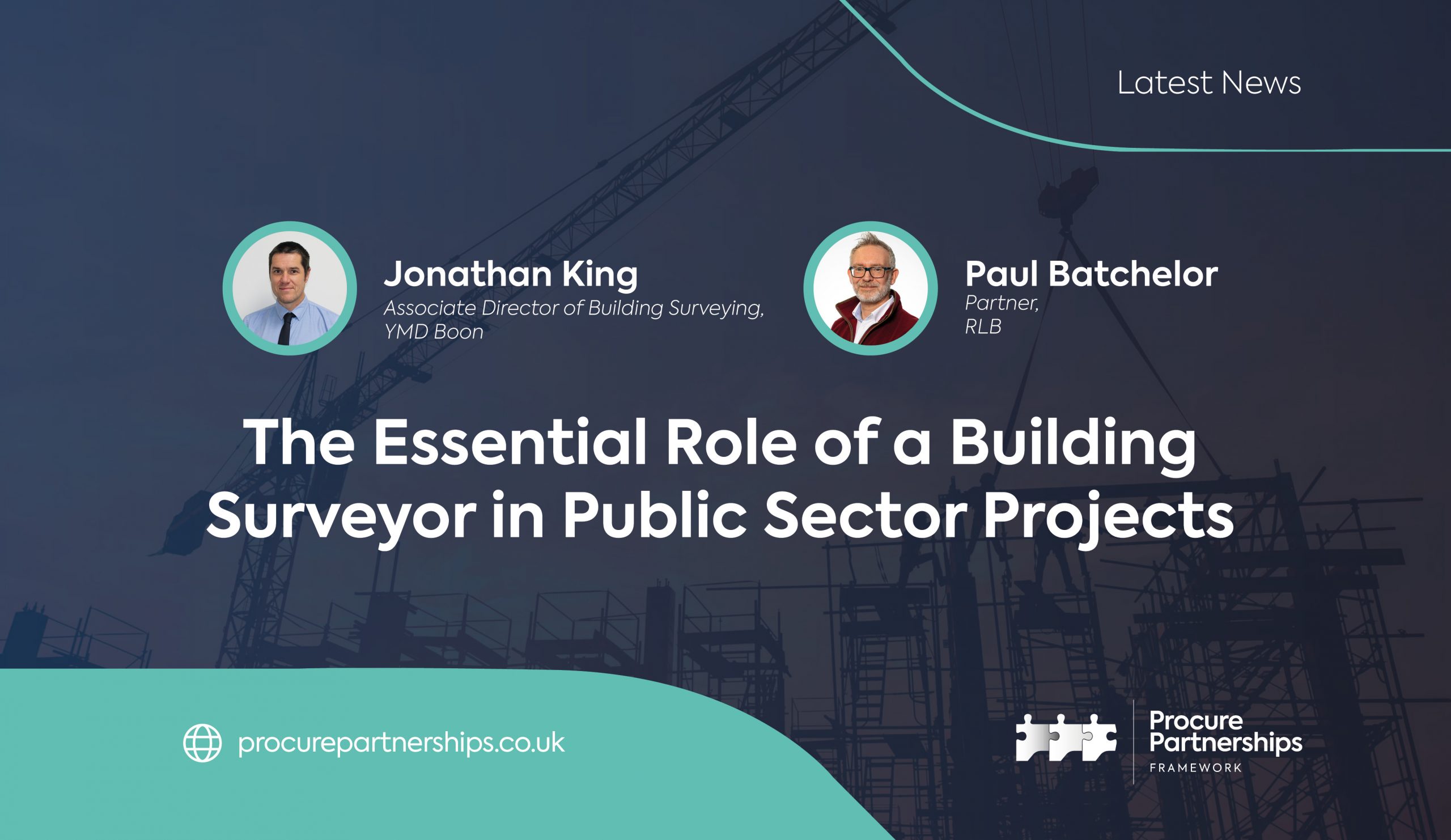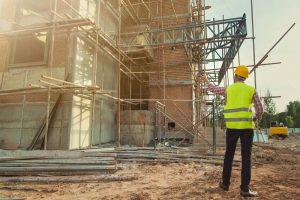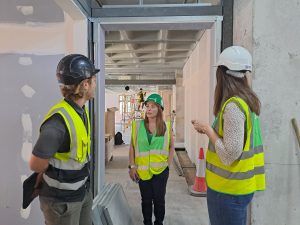A Building Surveyor is an essential part of any public sector project, whether it’s a new build, a renovation, or an ongoing maintenance plan. Their role is focused on ensuring buildings are safe, compliant with industry regulations, and structurally sound. But what exactly do they do, and why are they so important in public sector projects? In this expert blog, we bring the expertise of Paul Batchelor, Partner at RLB and Jonathan King, Associate Director of Building Surveying at YMD Boon to break it down for you.
The essential role of a Building Surveyor
Building Surveyors bring a mix of technical expertise and practical insight to every stage of a building’s life. From assessing the condition of a property before purchase to managing complex construction projects, their work covers a broad range of services. These include condition surveys, where they assess the health of a building, dilapidation surveys for leasehold properties, and defect diagnosis to pinpoint issues like damp or structural weaknesses.
They’re also crucial for larger-scale projects, where they take on roles such as contract administration, project management, and regulatory compliance to ensure the project stays on track, on budget, and meets all necessary legal and safety standards.
When should you engage with a Building Surveyor?
The earlier a Building Surveyor is involved in a project, the better the outcomes. Paul Batchelor from RLB explains, “The earlier you engage with a Building Surveyor, the greater influence they can have on the project. Their expertise can guide you through everything from strategic asset management to final project completion.”
Jonathan King at YMD Boon highlights that bringing a Building Surveyor in during the feasibility stage is key, especially for projects involving existing buildings. “They can assess any potential risks, advise on building constraints, and help shape the strategy right from the outset. It’s all about making sure you understand the scope and cost of the project before you get too far down the line.”
Key services of a Building Surveyor
Building Surveyors can be involved in all kinds of services, both during the design and construction phases and throughout a building’s ongoing use. Some of their core services include:
- Surveys and Assessments: Identifying defects, measuring the building, and assessing its current state.
- Design and Specification: Providing technical guidance and ensuring designs meet legal requirements and are feasible to execute.
- Contract Administration: Managing the relationship between clients and contractors, ensuring work is done on time and to standard.
- Project Management: Overseeing every phase of a project, from planning to final handover.
- Regulatory Compliance: Ensuring that all work complies with building regulations, planning laws, and health and safety standards.
- Asset Management: Providing advice on the long-term maintenance and futureproofing of a building.
How Building Surveyors offer protection for public sector clients
A Building Surveyor is more than just a technical expert; they are a vital source of protection for clients. Their role is all about managing risks, ensuring compliance, and guaranteeing that everything meets the required industry and compliance standards.
This protection extends beyond just the planning stages. Jonathan King emphasises that Building Surveyors can spot potential issues early, which can save clients from costly repairs down the line. “Their expertise in building pathology enables them to identify potential hidden issues during construction, allowing for early mitigation measures and helping to avoid costly delays. If there are structural or maintenance issues in the building, a Building Surveyor can flag them before they become serious problems. Early intervention helps avoid unexpected costs and keeps projects on track.”
Building Surveyors also ensure that quality is maintained throughout the building process. Paul Batchelor explains, “Quality monitoring is another key role. Building Surveyors help make sure that construction work is carried out to the right standards, which means fewer delays and fewer problems after the project is complete. A high standard of construction will also safeguard the value of the asset for future years.”
Paul shares how a Building Surveyor can support clients in quality issues post-contract too. “Our building surveyors have recently undertaken surveys of properties constructed in the past 12 years and identified latent defects, areas in which the original construction was not up to standard. In conjunction with the client’s legal advisor, we have successfully approached the original contractor to undertake remedial work at no cost to our client, under contract law.”
What makes a Building Surveyor different?
While there is some overlap in the roles of Building Surveyors, Project Managers, and Quantity Surveyors, each professional brings a unique set of skills to a project. While Project Managers focus on the overall coordination of the project and Quantity Surveyors manage cost estimates and budgets, Building Surveyors focus on the technical and physical side of the building itself. They are experts in the structure, condition, and compliance of buildings.
“While a Project Manager ensures the project is on time, and a Quantity Surveyor focuses on cost, a Building Surveyor’s role is to look at cost, time, and quality equally. They take a more technical approach, ensuring that the project’s design, construction, and operation all meet high standards,” Paul highlights.
FAQ: Do I need a Building Surveyor for a small project?
It’s a common misconception that only large-scale projects need a Building Surveyor, but that’s not the case. Jonathan stresses, “Even small projects, like home renovations or extensions, benefit from having a Building Surveyor on board. They can assess the existing structure, identify potential issues, and help make sure the project runs smoothly.”
For projects under £2 million, King adds, “Building Surveyors often take on multiple roles. They might act as lead designer, project manager, and contract administrator, which reduces the need for multiple consultants and streamlines the whole process.”
FAQ: Can a Building Surveyor help with property disputes?
Yes! Building Surveyors often act as mediators in property disputes. Whether it’s a party wall issue, a boundary dispute, or dilapidation concerns at the end of a lease, a Building Surveyor can assess the property’s condition and provide expert guidance.
Paul explains, “In any dispute where the condition of the property is in question, a Building Surveyor can provide an impartial, professional opinion to help resolve the issue.”
FAQ: How Do I Know If I Need a Building Surveyor?
If you’re planning a construction project, whether it’s a new build, a renovation, or even a property purchase, getting a Building Surveyor involved early is a smart move. They can identify potential risks, provide cost estimates, and ensure that the project complies with regulations.
Even if you’re considering a property purchase, a condition survey by a Building Surveyor can uncover hidden issues that might affect your decision. Jonathan adds, “A Building Surveyor can offer peace of mind by making sure you know exactly what you’re getting into, whether you’re buying or renovating.”
FAQ: Should I procure a Building Surveyor as part of a multi-disciplinary team or independently?
It depends on the size and complexity of your project. For smaller projects, Paul recommends hiring an independent Building Surveyor, as they can manage the project from start to finish. “With their broad range of skills, an independent Building Surveyor can offer great value and help keep things simple and streamlined.”
For larger or more complex projects, a Building Surveyor can be a key member of a multi-disciplinary team, working alongside architects, engineers, and other consultants. Jonathan explains, “In a multi-disciplinary team, the Building Surveyor ensures that the project is technically sound and meets all regulatory requirements, while other consultants handle the design and financial side.”
Jonathan shares how YMD Boon were appointed as part of a multi-disciplinary team by an Academy Trust to support the project’s feasibility and scope.
“The team secured £1.5m CIF funding for the block replacement by demonstrating, through surveys and feasibility studies, that demolition and replacement were essential.”
How we can support you
A Building Surveyor is a key figure in the successful delivery of any building project, providing valuable expertise that protects clients, ensures compliance, and guarantees high-quality results. Whether you’re managing a small renovation or overseeing a large-scale construction project, involving a Building Surveyor early on can save time, money, and headaches down the line.
At Procure Partnerships Framework, we can support you to procure a Building Surveyor independently or as part of a multi-disciplinary team. To find out more about our Professional Services Framework, visit https://procurepartnerships.co.uk/frameworks/.



